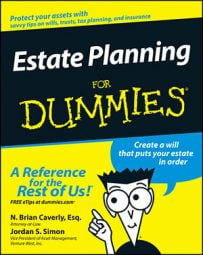Why would you want to use a will substitute (a legal agreement that transfers ownership upon your death) rather than your will for certain property? Property covered by a will substitute is transferred outside of probate, which may provide you with some significant advantages in the following:
Time. With will substitutes, property is typically transferred immediately upon your death, even if other parts of your estate are just beginning what may be a lengthy probate process.
Money. Will substitutes may save you and your estate some money, depending on whether or not your state’s version of the Estate Recovery Act — used to recover certain government-provided health care expenses you may receive — applies to your estate after you die. If the government is trying to grab part of your estate after you die under provisions of its Estate Recovery Act, you may be able to protect property from the government’s grasp by using will substitutes rather than your will.
If the resulting transfer of nonprobate property results in a death tax — whether state, federal, or any other tax — the taxes must still be paid. Will substitutes only help you do an end run around probate; applicable death taxes must still be paid. However, in many cases, will substitutes may reduce your taxes, so work with your accountant and attorney to coordinate your tax strategy with what you plan to do for will substitutes.
You can hold property in a variety of will substitute types, including:
Joint tenancy: This means that you and others have an equal and undivided ownership of some property.
Living trusts: These are a convenient for avoiding additional probates if you have real property like a house, vacation home, or income-producing investment property located in more than one state.
Additional will substitutes include:
Tenancy by the entirety: Similar to joint tenancy, the property’s co-owners have a right of survivorship feature that enables property to automatically transfer at the death of a co-owner to the surviving co-owner.
Payable on death accounts (PODs): This simple will substitute form keeps personal property out of probate. You fill out a form at your financial institutions and designate your account beneficiary. After your death, your beneficiary provides the financial institution with a copy of the death certificate and proof of identity, and then collects what is in the account.
IRAs, life insurance annuities, and other assets paid to named beneficiaries
Will substitutes predetermine who gets your property upon your death in one of two ways:
Right of survivorship: Whether you have a will or not is immaterial to the property transfer. If you have a will, the property transfers outside of your will. If you don’t have a will, the property transfers outside of intestate succession laws. The surviving joint tenant(s) receive(s) the property.
Beneficiary designation
Joint tenancy, tenancy by the entirety, and payable on death accounts use right of survivorship, while the other will substitute types use beneficiary designations.

